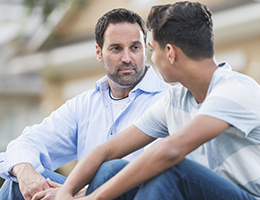
Dec. 16, 2019—It can be hard for parents to know what to say to their children in the wake of highly publicized school shootings and other violence. "Don't worry—it happened far away" may not be enough to console them when such incidents seem to be happening across the map.
Children may feel worried and afraid. They also may sense anxiety and stress in adults around them.
Knowing how to talk to your children about violence can ease their fears about their personal safety.
Mental Health America, the National Association of School Psychologists and the American Academy of Pediatrics offer parents the following suggestions:
Ask kids what they know. You might start with a simple, "What have you heard?" and "What questions do you have?" Avoid graphic details, but it's best to be honest and direct with your answers. To help make sure they are getting the facts from you, set reasonable limits on what they can see on TV and online.
Encourage children to talk about their concerns and feelings. You might ask if they feel safe at school, for instance. Keep your discussion age-appropriate. For example, younger children might express themselves better through drawing or play. Older children may have strong opinions about what should be done to make schools safer. Be a good listener.
Reassure children that they are safe. As they talk about their fears, you can help put things into perspective by reassuring them that serious acts of violence are not as common as they may seem. But don't minimize their feelings.
Talk honestly about your feelings too. Let children know they aren't the only ones feeling fearful. If your child asks a difficult question, don't be afraid to say "I don't know." Tell your child that acts of violence can't always be explained, and even adults have a hard time dealing with them.
Empower children to take action for their own safety. Encourage them to report disturbing incidents—such as bullying, threats of suicide or talk about weapons—to a teacher, parent or other responsible adult. You can also help them think about peaceful ways to resolve conflicts. And encourage older children to take part in student-driven anti-violence programs.
Keep the conversation going. Make safety a common topic in family talks, instead of just responding to the latest incident. Review their school's safety procedures—and what they should do in an emergency.
Look for signs your child is struggling. Younger children may not want to attend school or go out in public. Behaviors like thumb-sucking or not wanting to sleep alone may reappear in children who had outgrown them. Teens may minimize their concerns outwardly but may become argumentative or withdrawn.
Seek help when needed. If you're worried about your child's behavior, contact your pediatrician or a children's mental health therapist.
What else can you do as a parent to help stem the tide of school violence? Consider these steps to help your child learn to solve problems in peaceful ways.